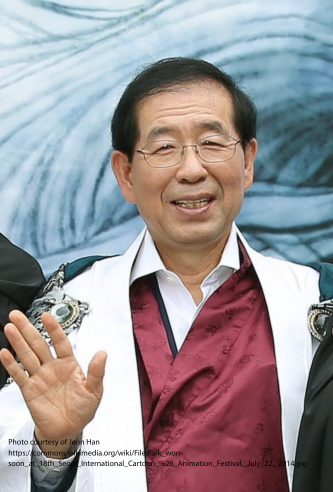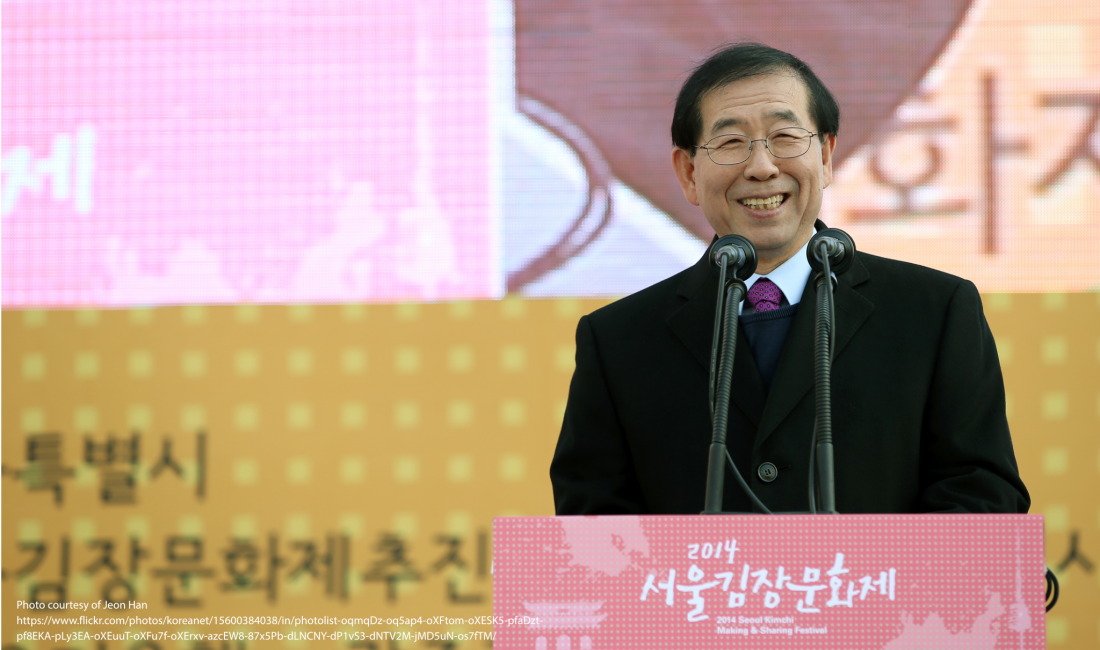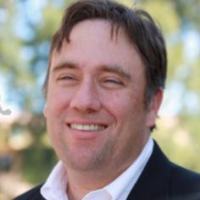After suicide and scandal, Korean local democracy finds new life.
On July 9, 2020, the popular third-term mayor of Seoul, Park Won-soon—a man respected around the world for innovative work on local democracy and governance—scribbled down a note (“I apologize to everyone”) and killed himself on Mount Bugak on the north side of his city.
The suicide immediately followed scandal. A day before his death, the mayor's secretary had accused him of sexual harassment, accusations later found credible by Korea’s national human rights commission. The combination of the death and the allegations was felt, both in Seoul and around the world, as a shock and a betrayal.
In Korea, Park's friends and allies, many of whom had expected the mayor to become Korea’s next president, found themselves questioning how well they really knew him. What had happened to this self-proclaimed feminist who, as a pioneering activist and lawyer, had championed human rights and women’s rights, and even represented the victim in one of Korea’s first successful sexual harassment lawsuits?
Outside Korea, those of us who had come to know and admire Park, then considered the planet’s most activist mayor (with the possible exception of Barcelona’s Ada Colau), worried about what his tragic and scandalous death would mean for the democratic advances he’d made in Seoul and in collaboration with other cities worldwide.
This January, I visited Seoul for the first time since Park’s death. I hung out at city hall and, across Sejongno Street, at the metropolitan council. There, I felt a sense of real loss, and continued puzzlement, from Park's previous allies about how and why the late mayor had abused his power over a subordinate. But I also found that his determination to change Korea’s sago bangshik, or way of thinking, persists, though not always in the same places where he once worked.
In Seoul itself, much has disappeared since Park’s party lost the elections after his death. The city hall still bears the aesthetic hallmarks of his mayoralty—the building signs still read "Citizens Hall" (as he renamed it), its lower floors remain open for community meetings, and the new administration had kept the building’s “ear” design, which Park, who had the demeanour of a gadfly, added to show that the city government was listening to Seoul’s people.
But many of the 100-plus democratic processes that Park's administration had developed—including resident-led participatory budgeting and planning groups—are gone. Other innovations, like community energy co-ops and a social innovation park, have withered.
With less citizen participation, Seoul has reverted to its bad habit of bulldozing the old. Park, in listening to citizens, was often a champion for protecting and renewing neighbourhoods and urban villages—like Ihwa and Jangsu—that define Seoul.
“Instead of demolishing housing and buildings with tenants and residents, we chose a way to preserve the historical, cultural values of the neighbourhoods, preserving the structures of people’s lives,” Park once told an interviewer. “This has in time, proven to be a better solution for peoples’ lives, the local economy and better for our earth.”
Unfortunately for the world, Park’s death also effectively gutted Seoul’s once extensive infrastructure exporting its policies to other local governments. Two departments he helped grow, the Global Urban Partnership Division and the Seoul Urban Solutions Agency, are diminished. During Park’s tenure, Seoul collaborated with more than 50 other cities on 65 policies—including building an urban “big-data” system with Buenos Aires, inventing a new way to “regenerate” dirty urban waterways with New Delhi, and creating a sustainable development strategy with Kampala, Uganda.
But the spirit of Seoul in 2010s is not dead. It has migrated outward into Gyeonggi province, a collection of suburbs that rings around Seoul like a doughnut. Gyeonggi’s 28 different cities, home to more than 13 million people cumulatively, lately have been winning national awards and international notice for democratic innovations.
In Anyang, a city of 600,000, Mayor Choi Dae-ho, sometimes in the face of opposition from the conservative national government, has championed a citizen-led committee that co-creates policies and regulations. The city has also developed structures to give youth and young adults more power over civic affairs. Through such bodies, the city now enhances payments to young families, offers scholarships for college students, subsidises drivers who switch to environmentally friendly cars and makes its finances fully transparent. The city was recently ranked the least corrupt in Korea.
“There is still resistance to more democracy on the local level,” Choi told me. “But more cities here are pursuing it.”
So are some provincial governments, including Gyeonggi’s. The province's legislative body is evenly divided—with 78 members of each of the two largest parties—so participation has become one way to make space for compromise. The province is also trying to build a participation process on behalf of residents of the north side of the country, which struggles to grow because it is on the North Korean border and subject to national security restrictions.
Back in Seoul after visiting Gyeonggi, I encountered Park’s democratic spirit at the watchdog organisation he helped found decades ago, People’s Solidarity for Participatory Democracy. Its staff and organisers were badly divided after his death, but they’ve gone forward by focusing on the work of encouraging participation and checking government corruption, in part by supporting whistleblowers, including the increasing number of women reporting sexual harassment in major institutions.
Before his time as mayor, Park also had started the grant-making Beautiful Foundation (with a Beautiful Store to which people could bring items they wanted to recycle) and a “think-and-do” tank called the Hope Institute. Both remain ongoing concerns. When I asked a friend of Park how she reconciled his democratic record with his harassment of a subordinate, she said the lesson was not to put too much faith in one leader, but rather to focus on the progress you can make yourself with neighbours and colleagues.
Park, she recalled, liked to ask visitors to the Hope Institute, “Where can you find hope?” After they answered, the future mayor would tell them that he kept his own hope behind a door in one corner of the room. When he opened the door, he revealed a mirror, in which visitors could see their own reflection.
Joe Mathews writes the Democracy Column for Democracy Local, of which he is a founder and publisher. He also serves as columnist and Democracy Editor at Zócalo Public Square and a fellow in the Renovating Democracy program at the Berggruen Institute.





